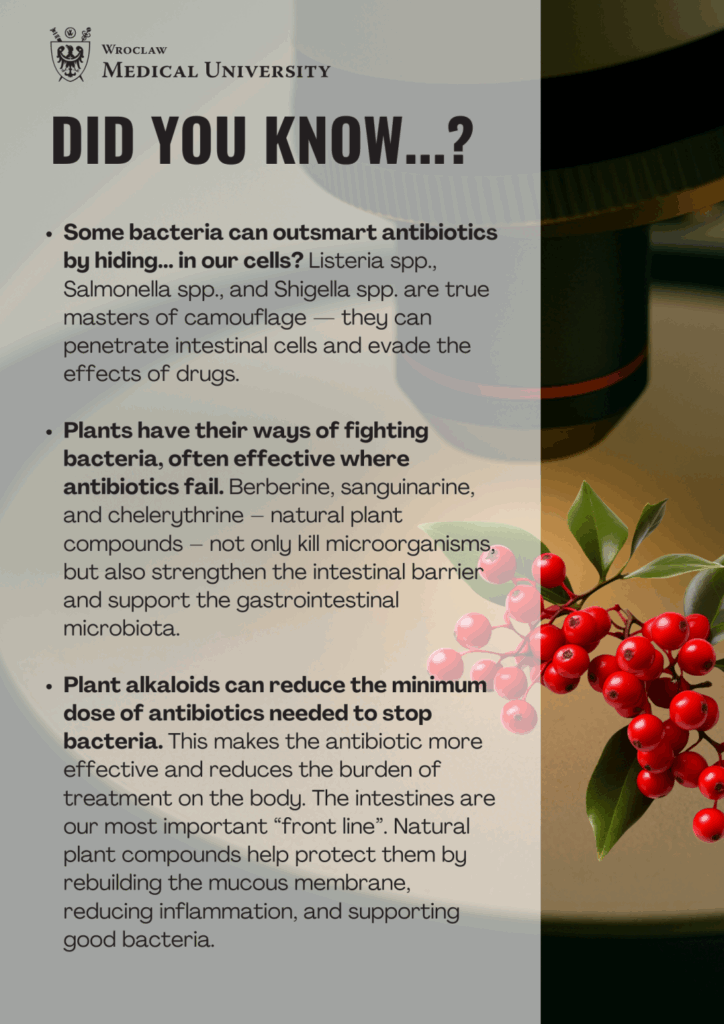Plant alkaloids surprise with their effectiveness
When standard medical treatments fail, nature may have the answer. Berberine, sanguinarine, and chelerythrine are three plant compounds that are increasingly being studied by scientists as potential aids in the treatment of dangerous intestinal infections.
In some cases, antibiotics are no longer as effective as they used to be. Resistant bacteria are spreading faster than new drugs are coming onto the market. And in this case, it’s not just about simple “food poisoning.” Bacteria such as Shigella spp., Salmonella spp., enteroinvasive strains of E. coli, Listeria spp., Campylobacter spp., and Yersinia spp. can cross the intestinal barrier and cause serious, life-threatening health complications. It is estimated that more than 400,000 people worldwide die each year as a result.
Faced with these difficulties, scientists are beginning to look to plants. Three isoquinoline alkaloids—berberine, sanguinarine, and chelerythrine—are gaining a reputation as natural aids/worthy substitutes for antibiotics. Not only do they “kill” bacteria, but they also strengthen the intestinal mucosa, soothing inflammation and restoring the balance of the intestinal microbiota.
Due to the bioactive compounds they contain, they have a strong antimicrobial effect. They work in many ways, including damaging the cell membrane of bacteria, increasing its permeability, inhibiting biofilm formation, and even, interestingly, inactivating the enzymes responsible for the development of antibiotic resistance, says Dr. Anna Duda-Madej from Wroclaw Medical University, author of a review paper.
Berberine – from the plant pharmacy
It comes from barberry and has been used in folk medicine for hundreds of years to treat stomach aches. Today, research shows that berberine not only has antibacterial properties but also seals the “gaps” between intestinal cells. It also inhibits the development of bacterial biofilms – the same ones that protect bacteria from antibiotics.
Not enough? Berberine “talks” to our microbiota. It increases the number of beneficial bacteria, such as Akkermansia and Lactobacillus, and reduces the number of pathogens. In clinical trials, it helped patients with irritable bowel syndrome and supported the treatment of Helicobacter pylori infection.
Sanguinarine – a warrior in a double battle
This alkaloid isolated from poppy plants (Papaveraceae) is a master at extinguishing intestinal fires. In models of colitis, it effectively reduced inflammatory cytokines and improved the structure of the mucous membrane. It was as effective as some anti-inflammatory drugs.
In addition, sanguinarine can block key bacterial “weapons” – such as secretory systems that allow them to invade cells. In the laboratory, it combined forces with antibiotics, enhancing their activity against Listeria spp. and Salmonella spp.
Chelerythrine – guardian of intestinal integrity
Chelerythrine is the least known of the three, but no less promising. It inhibits excessive chloride secretion in the intestine, which can reduce diarrhea during infection. It also helps to rebuild intestinal villi after damage, e.g., that caused by ischemia.
In combination with antibiotics, it reduced the invasiveness of Salmonella spp. and Shigella spp. It has the potential to support the body in maintaining a balance between the defensive response and the destruction of its tissues.
The intestinal barrier – an invisible shield
Why are natural compounds such as berberine, sanguinarine, and chelerythrine so valuable? Because they not only fight pathogenic bacteria, but also support the intestinal barrier – the body’s first line of defense.
The intestinal barrier plays a key role in protecting our body against the harmful effects of external factors, including pathogens and the metabolites they produce (e.g., toxins). Probiotics and prebiotics, including natural compounds, play an essential role in protecting the intestinal epithelium, maintaining the balance of the intestinal microbiota, and stimulating the immune system, preventing the development of inflammation, emphasizes Dr. Duda-Madej.
Support for antibiotic therapy
Although plant alkaloids cannot fully replace antibiotics, they can be an essential element in supporting treatment, especially in an era of growing antibiotic resistance. Their advantage is not only their antimicrobial activity, but also their beneficial effect on the microbiota and intestinal barrier integrity, which can reduce recurrent infections and chronic inflammation.
Traditional compounds are a component of many drugs and therapies. They can act synergistically with antibiotics, lowering their minimum inhibitory concentration (MIC), i.e., the lowest dose needed to stop bacterial growth, and thus allowing for a reduction in therapeutic doses of antibiotics. They also exhibit anticancer activity, inhibiting the tumorigenesis pathways activated after infection with specific pathogens. Therefore, they appear to be a valuable supplement to particular treatments,” points out Dr. Duda-Madej.
However, the next step must be to refine the technology for administering these compounds and confirm their safety and efficacy in well-designed clinical trials. Only then can natural alkaloids realistically enter everyday therapy as a supplement to classic pharmacotherapy — and perhaps help break the deadlock associated with growing bacterial resistance.

This material is based on an article:
Can Nature Overcome Invasive Gastrointestinal Infections?
International Journal of Molecular Sciences
Authors: Anna Duda-Madej, Szymon Viscardi, Jakub Stecko, Natalia Szymańska, Ewa Topola, Katarzyna Pacyga-Prus, Marta Szandruk-Bender.